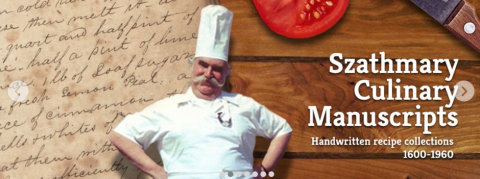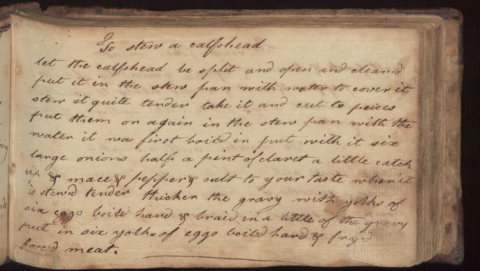 If you’ve ever tried to follow a recipe from your grandmother’s collection, squinting at her spidery writing on a stained 3x5 card, you might be a candidate for the University of Iowa Libraries’ latest DIY History project.
If you’ve ever tried to follow a recipe from your grandmother’s collection, squinting at her spidery writing on a stained 3x5 card, you might be a candidate for the University of Iowa Libraries’ latest DIY History project.
The University’s special collections manages the Szathmary Culinary Manuscipts and Cookbooks, a handwritten collection of American and European recipes from the 1600s to the 1960s.
Helpful foodies, history buffs and handwriting sleuths are invited to participate in UI’s crowdsourcing history project by transcribing digitized images of recipes.
It’s not the first time the university has outsourced a portion of its archival handwork. Last year the Civil War Diaries and Letters Transcription Project was powered by volunteers, who transcribed more than 15,000 pages of material. All you need to do is select a page from within the collection and get started. So far more than 17,000 pages have been transcribed and volunteers chat and post questions on a discussion forum.
An example of the historical nuggets uncovered while transcribing: a posnet is an 18th century term for a small metal pot, a spider is a skillet, and to scearce is to sift. Of course no cookbook historian has completed their task until they have actually tried the recipes themselves. This could be interesting for the lucky transcriber of a recipe from Abigail Wellington Townsend’s cookbook, circa 1840:
To stew a calfshead, let the calfshead be split and open and cleaned put it in the stew pan with water to cover it stew it quite tender take it and cut it to pieces put them on again in the stew pan with the water it was first boiled in put with it six large onions half a pint of claret a little catch up a little mace & pepper & salt to your taste when it is stewed tender thicken the gravy with yolks of six eggs boiled hard & braid in a little of the gravy put in six yolks of eggs boiled hard & fry’d forced meat.
Kate Rix writes about digital media and education. Find more of her work at and thenifty.blogspot.com.



This is an excellent project as so much quirky information and history can be shared.
Looking for my grandmother’s recipe for Divinity. Anyone?
Not sure how old this recipe is. Found it in an old recipe box from my dad.
Divinity
2 cups sugar
1/2 cup white karo
1/2 cup water
2 egg whites
1 cup chopped nuts
1 teaspoon vanilla
Boil sugar, syrup, water until mixture dropped in cold water turns brittle. Pour slowly over stiffly beaten egg whites, add nuts and flavoring. Beat until creamy. Pour over buttered plate.